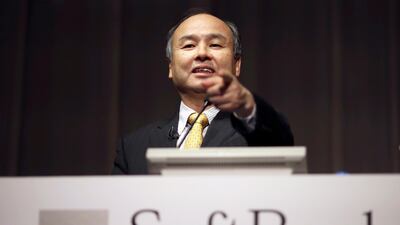SoftBank Group’s fourth-quarter profit topped analysts’ projections, thanks to Sprint’s first annual net income in more than a decade.
The US wireless subsidiary is planning to merge with rival T-Mobile US.
The Japanese telecommunications provider and technology investor said operating profit was ¥155 billion (Dh5.14bn) in the three months ended March, more than the ¥137.4 bn average of analyst estimates compiled by Bloomberg. Revenue was ¥2.35 trillion.
The results are overshadowed by the sale of Sprint, a deal that SoftBank founder Masayoshi Son had pursued for years. T-Mobile last month agreed to acquire the smaller rival for $26.5bn in stock, but the merger is likely to face heavy scrutiny from regulators. SoftBank is also planning an initial public offering of its domestic telecom operation, as Mr Son has shifted his focus to SoftBank’s longer-term future and investments in overseas technology companies. Last year, he formed the Vision Fund, raising more than $90bn from big backers including Saudi Arabia and Apple.
“Investors want to hear from Son about two things most of all: what will happen to Sprint and his thoughts about the investment fund,” said Tomoaki Kawasaki, an analyst at Iwai Cosmo Securities. “Investors expect that the Sprint deal will improve earnings that SoftBank books on its balance sheet, but they want to hear it from Son directly.”
The Sprint sale follows years of deliberations between Deutsche Telekom, the German company that controls T-Mobile, and SoftBank. Mr Son sought to acquire T-Mobile in 2014, but the deal fell apart on antitrust concerns. President Donald Trump’s administration raised prospects of a more forgiving regulatory environment, but a round of talks collapsed last year. A merger would reduce the US wireless industry to three major competitors from four, and they will have to prove the deal won’t result in higher prices for consumers.
_______________
Read more:
SoftBank chief Son agrees $80bn Sprint and T-Mobile US merger
Truck hailing app Manbang said to get $1.9bn backing from SoftBank, Alphabet and others
_______________
Sprint and T-Mobile have complementary wireless spectrum that could be a strategic advantage as the companies build out a 5G network. T-Mobile controls a large portfolio of lower-band airwaves that can travel long distances and pass through walls and windows. Sprint, meanwhile, has the largest US holding of higher-band, 2.5-gigahertz spectrum, which can handle more data capacity but over limited distances.
Sprint’s outgoing chief executive Marcelo Claure has succeeded in reversing a customer exodus and cutting costs at the carrier since Mr Son put him in charge of the turnaround. Sprint added 39,000 wireless subscribers in the fiscal fourth quarter, compared with a loss of 118,000 a year earlier. The company reported quarterly net income of $69 million last week, while analysts were projecting on average a net loss of $349m. Mr Claure will take the chief operating officer job at SoftBank and become CEO at SoftBank Group International. The move is expected to happen before the end of the month.
Revenue from domestic telecom operations, which include wireless, broadband and fixed-line services, was mostly flat at ¥3.23tn last year. Profit declined 2.6 per cent to ¥1.18tn after the company offered discounts to lure users and increased capital outlays to improve network quality. SoftBank, which has 33 million mobile subscribers, said sales and profit will increase this fiscal year.
The Vision Fund contributed ¥303bn to income in the year ended March, the company said. The amount mainly reflects an unrealised gain on valuation of SoftBank’s investment in Nvidia. The company took a stake of just less than 5 per cent in the chip maker last year. Nvidia’s stock rose 81 per cent in 2017 and another 20 per cent this year to March.
SoftBank’s shares have declined about 4 per cent this year, while the value of its stake in Alibaba increased by 14 per cent. SoftBank holds equity in Alibaba worth about ¥15tn, or more than 50 per cent above its own market value.
“The thinking behind the Vision Fund sort of makes sense, but what not clear is how will this impact SoftBank’s earnings in the short term,” Mr Kawasaki said. “It would be great if the company could give investors a way to track performance of all these investments. That might help narrow SoftBank’s valuation gap.”

